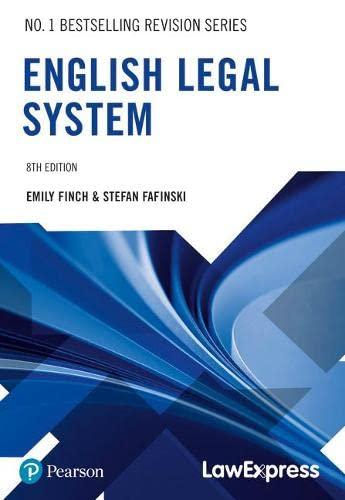Question
1) Savant Homes, Inc., is a custom home designer and builder. Using what it called the Anders Plan, Savant built a model house in Windsor,
1) Savant Homes, Inc., is a custom home designer and builder. Using what it called the Anders Plan, Savant built a model house in Windsor, Colorado. This was a ranch house with two bedrooms on one side and a master suite on the other, separated by a combined family room, dining room, and kitchen. Ron and Tammie Wagner toured the Savant house. The same month, the Wagner's hired builder Douglas Collins and his firm, Douglas Consulting, to build a house for them. After it was built, Savant filed a lawsuit in a federal district court against Collins for copyright infringement, alleging that the builder had copied the Anders Plan in the design and construction of the Wagner house. Collins showed that the Anders Plan consisted of standard elements and standard arrangements of elements. In these circumstances, has infringement occurred? Explain. [Savant Homes, Inc. v. Collins, 809 F.3d 1133 (10th Cir. 2016)] (SeeCopyrights.)
2) Sandra White operated a travel agency. To obtain lower airline fares for her nonmilitary clients, she booked military-rate travel by forwarding fake military identification cards to the airlines. The U.S. government charged White with identity theft, which requires the "use" of another's identification. As background, the court in theWhitecase had two cases that represented precedents. In the first case, David Miller obtained a loan to buy land by representing that certain investors had approved the loan when, in fact, they had not. Miller's conviction for identity theft was overturned because he had merelysaidthat the investors had done something when they had not. According to the court, this was not the "use" of another's identification. In the second case, Kathy Medlock, an ambulance service operator, had transported patients for whom there was no medical necessity to do so. To obtain payment, Medlock had forged a physician's signature. The court concluded that this was "use" of another person's identity. Which precedenttheMillercase or theMedlockcaseis similar to White's situation, and why? How would you describe the parties' ethics in all of these cases? Discuss. [United States of America v. Sandra Maxine White, 846 F.3d 170 (6th Cir. 2017)] (SeeSources of American Law.)
Step by Step Solution
There are 3 Steps involved in it
Step: 1

Get Instant Access to Expert-Tailored Solutions
See step-by-step solutions with expert insights and AI powered tools for academic success
Step: 2

Step: 3

Ace Your Homework with AI
Get the answers you need in no time with our AI-driven, step-by-step assistance
Get Started


